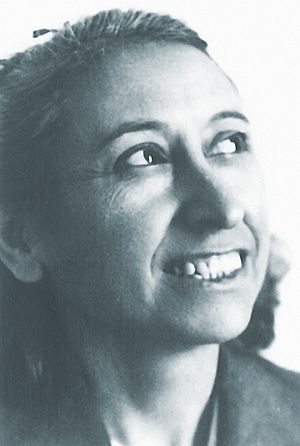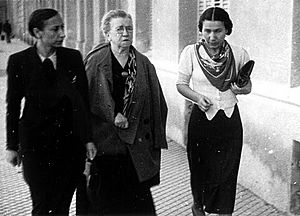Lucía Sánchez Saornil facts for kids
Quick facts for kids
Lucía Sánchez Saornil
|
|
|---|---|

Lucía Sánchez Saornil (1939)
|
|
| Born | 13 December 1895 Madrid, Spain |
| Died | 2 June 1970 (aged 74) Valencia, Spain |
| Pen name | Luciano de San Saor |
| Occupation | Journalist, trade unionist, writer |
| Language | Spanish |
| Nationality | Spanish |
| Period | 20th century |
| Genre | Poetry |
| Literary movement | Ultraism, anarcha-feminism |
| Partner | América Barroso |
Lucía Sánchez Saornil (1895–1970) was a Spanish writer and activist. She is famous for helping to start an important group called Mujeres Libres (Free Women). She founded this group with Mercedes Comaposada and Amparo Poch y Gascón.
Lucía grew up in a working-class family in Madrid. She learned a lot on her own from a young age. She started writing poems for new art styles like Futurism.
In 1931, Spain became a republic. Lucía joined a large workers' union called the Confederación Nacional del Trabajo (CNT). She became active in the anarchist movement in Spain. She soon noticed that men in the movement often treated women unfairly. This made her believe that women needed their own groups to organize and gain power.
She created a plan for such a group. With Mercedes Comaposada and Amparo Poch y Gascón, she started Mujeres Libres. This was a national group of women who believed in freedom and equality.
During the Spanish Civil War, Lucía continued her work with Mujeres Libres. She also worked as a secretary for Solidaridad Internacional Antifascista (SIA). She often traveled to the front lines of the war. She worked to get international support for the Republicans. After her side lost the war, she went into hiding in Valencia, Spain. She lived there for the rest of her life.
Contents
Lucía's Early Life and Work
Lucía Sánchez Saornil was born in Madrid. Her family was poor and worked hard. She taught herself many things. From a young age, she showed talent as a poet. She wrote for magazines that supported the Futurist movement. In 1916, she began working as a switchboard operator. At that time, more and more women were starting to work in this field.
Fighting for Women's Rights
In 1931, Spain became the Second Spanish Republic. Lucía took part in a strike against a phone company called Telefónica. This strike led her to join the Confederación Nacional del Trabajo (CNT). She quickly realized that even though the new republic promised women's rights, women still faced many challenges. She began to speak out for women's power through learning.
As an activist in Barcelona, Lucía suggested creating a women's education group. She spoke to several workers' unions, but they all said no. So, she decided to go back to Madrid.
In Madrid, she met Mercedes Comaposada, who was studying law. In 1933, they both went to a CNT meeting. They were invited to be "women teachers." But the men at the meeting ignored them and treated them poorly. Frustrated, they left the meeting early. They started talking about what they could do differently in Retiro Park.
Lucía was working for a railway union at the time. She got a list of women's groups that supported workers' rights. They wrote to these groups, asking about their experiences and problems. They received many replies from all over Spain. By 1935, these letters helped create a network of women's groups across the country.
As these groups grew, Lucía also wrote articles about women's issues. Her articles appeared in magazines like Tierra y Libertad and Solidaridad Obrera. The leader of the CNT, Marià Rodríguez i Vázquez, wrote articles about women in the CNT. He said he supported women, but thought women's freedom should wait until workers won their fight.
Lucía responded with her own series of five articles called "La cuestión femenina" (The Women's Question). These articles laid the groundwork for a women's organization. She called for a group run by and for women. Her plan included classes to help women learn to read and write. It also suggested training for different jobs and groups to help women gain confidence and power.
These discussions led to the creation of the Mujeres Libres organization. Lucía Sánchez Saornil and Mercedes Comaposada started it with Amparo Poch y Gascón, a doctor. This new group aimed to free women from being held back by a lack of knowledge, unfair treatment, and unfair work.
Lucía became known as a strong leader and speaker within Mujeres Libres. She wrote many articles for the Mujeres Libres magazine. One article was about farm workers in Castile. It helped city readers understand life in the countryside.
Lucía's Role in the Civil War

When the Spanish Civil War began, Lucía helped defend Madrid. She worked as a journalist and wrote messages to support the anarchists. She used her poems to spread ideas and encourage people. Her writing was important for the Republicans.
Her work caught the attention of Emma Goldman, another anarchist. They wrote to each other often. This inspired Lucía to organize an international effort to support the Spanish revolution.
Lucía moved to Valencia, which was the Republican capital. There, she became an editor for anarchist newspapers. The Republicans faced a shortage of food and supplies. This was made worse by people fleeing from the other side and a ban on trade by Britain and France. Lucía wrote about this situation and raised money for the Republican cause.
She became the general secretary of Solidaridad Internacional Antifascista (SIA). She regularly made trips to the front lines with other women from Mujeres Libres and the CNT. One goal of Mujeres Libres visiting the front was to educate the soldiers. They wanted to create a "thoughtful and responsible female force."
Lucía and Mercedes Comaposada also asked the government to recognize Mujeres Libres. But the government refused. They said Mujeres Libres was not a formal organization with official committees. In response, Mujeres Libres held its first national meeting in August 1937. They reorganized themselves into a national group, similar to the CNT.
However, even after reorganizing, Mujeres Libres still did not get much support from the wider anarchist movement. In December 1938, a women's center was taken over by the government. Although some groups helped, the CNT did not offer much support to Mujeres Libres.
Lucía also refused to join a Communist-led women's group. She believed Mujeres Libres could continue its work without becoming part of a government structure. She believed that different women's groups should keep their unique character. They should all work together for women's freedom.
Later Life and Legacy
In February 1939, the Nationalists took over Catalonia. Lucía had to flee to France. She was held for a short time in a camp there. After she was released, she helped Spanish people who had fled the war. This made her a target when France was taken over by Nazi Germany.
She was arrested but managed to escape before being sent to a prison camp. During a time of harsh punishment in Spain, she decided to return secretly. She lived there carefully, staying hidden. She had not been publicly photographed during the war, and most of her writings were anonymous. A friend, whom Lucía had helped during the war, sheltered her in Valencia. Lucía earned a living doing temporary jobs. She accepted that the republic had lost, but she kept her hopes alive through her writing.
Lucía spent much of her later life caring for her sister, Conchita, who had a long-term illness. She lived for 30 years with her partner, América Barroso. Months after her sister's death, Lucía Sánchez Saornil died on June 2, 1970. América Barroso put a line from one of Lucía's poems on her gravestone: "But can it be true that hope has died?"
Lucía's Writing
Lucía Sánchez Saornil wrote under a male pen name, Luciano de San Saor. Her poems explored themes of love and identity at a time when such topics were not openly discussed. She also wrote poems about factories, religion, marriage, and economic change. Some of her poems include "Sensual Twilight" and "Romance of Durruti."
She also wrote essays like "The Question of Feminism." In these essays, she explained why she helped create Mujeres Libres, both the magazine and the organization. One of her stronger essays, "The Marriage Ceremony or Spiritual Cowardice," criticized marriage as a business deal.
See also
 In Spanish: Lucía Sánchez Saornil para niños
In Spanish: Lucía Sánchez Saornil para niños
- Anarcha-feminism
- Anarchism in Spain
 | May Edward Chinn |
 | Rebecca Cole |
 | Alexa Canady |
 | Dorothy Lavinia Brown |

